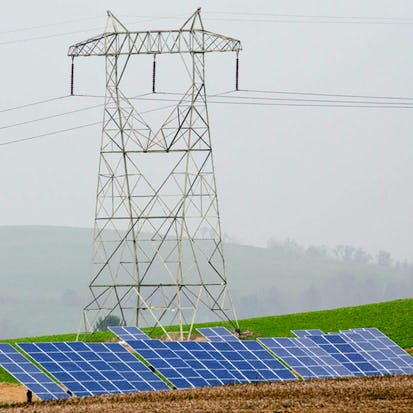- Level Professional
- Duration 17 hours
- Course by The State University of New York
-
Offered by

About
Solar Energy System Design builds upon the introduction to PV systems from Solar Energy Basics course, which included basic system components and functions, as well as some basic system sizing using simplifying assumptions. You should at this point have a basic understanding of electrical power and energy, be able to calculate the energy needs of a site as well as energy production potential for a PV system at a given location under optimal conditions. Much of this course will focus on incorporating on the ground conditions into energy production considerations, and how to account for these conditions in system design and equipment selection. By the end of this course you should be able to incorporate losses in irradiance due to array setups with less than optimal positioning and/or shading, and account for variations in module output due to temperature variations in your system design.Modules
Course 2 Welcome
1
Videos
- Welcome from Dr. Neal Abrams
Energy from the Sun
1
Assignment
- Solar energy
2
Videos
- The Sun and the Solar Spectrum
- The Sun-Earth Relationship
Sunlight from space to the Earth's surface
1
Assignment
- Sun-atmosphere interactions
1
Videos
- The Sun and Atmosphere
Dealing with the variation in sunlight across the Earth
1
Assignment
- Variation in insolation
4
Videos
- Solar Irradiance
- Finding Solar Insolation
- Using Insolation Data
- Insolation to PV Energy
1
Readings
- Getting insolation data from NREL
Module 1 Quiz
1
Assignment
- Solar energy from source to panel
Circuitry basics
1
Assignment
- Circuitry Basics
2
Videos
- Electricity and Circuits
- The PV Circuit
Circuits and electrical characteristics of PV modules and arrays
1
Assignment
- PV modules and array circuits
3
Videos
- Measuring power in a PV circuit
- PV and Electrical Interactions- Efficiencies from cell to array
- Electrical characteristics in PV arrays- Variations in productivity
1
Readings
- Bypass diodes vs. blocking diodes
Module 2 Quiz
1
Assignment
- Photovoltaic module and array electrical characteristics
Sizing PV systems and calculating site specific output
2
Assignment
- Module and array conditions
- PV Watts Practice
2
Videos
- PV Sizing and Output
- Orientation and Tilt
PV output changes with temperature
1
Assignment
- Temperature dependent output
2
Videos
- Temperature Dependent Output
- Temperature Dependent Output as a Percent
1
Readings
- Finding critical temperature data
Shading losses
2
Assignment
- Shading Practice
- Shading calculations using PV Watts
3
Videos
- Measuring Shading at a Site
- Analyzing Shading and Calculating Insolation
- PV Output Reduction Due to Shading
1
Readings
- Tools for Measuring Shading
Module 3 Quiz
1
Assignment
- PV Sizing and output under different conditions
Site surveys, checklists, and an introduction to permitting
1
Assignment
- Site surveys and permits
2
Videos
- Module 4 Introduction
- Residential Site Survey
1
Readings
- Site checklists and Unified Solar Permits
System design from module and array selection, to sizing strings of modules
1
Assignment
- Module and inverter selection quiz
3
Videos
- Array Sizing and Module Selection
- Inverter Sizing and Selection
- String sizing for the inverter
Module 4 Quiz
1
Assignment
- Grid tied design Quiz
Putting it all together quiz
1
Assignment
- Putting it all together
1
Readings
- Putting it all together to design a photovoltaic system
Capstone Project
1
Peer Review
- Capstone Project
Auto Summary
Discover Solar Energy System Design, a professional-level course that builds upon Solar Energy Basics, offered by Coursera. This course delves into advanced PV system design, focusing on real-world conditions, energy production, and equipment selection. Over 1020 minutes, learners will master how to account for irradiance losses and temperature variations in their designs. Available with Starter and Professional subscription options, this course is ideal for those with a foundational understanding of electrical power and energy, aiming to specialize in solar energy systems.

Neal Abrams


